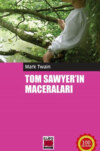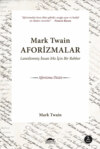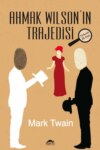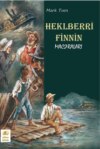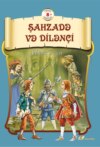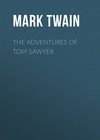Kitabı oku: «Roughing It», sayfa 22
[Since the above was in type, I learn from an official source that the above figure is too high, and that the yield for 1863 did not exceed $20,000,000.] However, the day for large figures is approaching; the Sutro Tunnel is to plow through the Comstock lode from end to end, at a depth of two thousand feet, and then mining will be easy and comparatively inexpensive; and the momentous matters of drainage, and hoisting and hauling of ore will cease to be burdensome. This vast work will absorb many years, and millions of dollars, in its completion; but it will early yield money, for that desirable epoch will begin as soon as it strikes the first end of the vein. The tunnel will be some eight miles long, and will develop astonishing riches. Cars will carry the ore through the tunnel and dump it in the mills and thus do away with the present costly system of double handling and transportation by mule teams. The water from the tunnel will furnish the motive power for the mills. Mr. Sutro, the originator of this prodigious enterprise, is one of the few men in the world who is gifted with the pluck and perseverance necessary to follow up and hound such an undertaking to its completion. He has converted several obstinate Congresses to a deserved friendliness toward his important work, and has gone up and down and to and fro in Europe until he has enlisted a great moneyed interest in it there.
CHAPTER LIII
Every now and then, in these days, the boys used to tell me I ought to get one Jim Blaine to tell me the stirring story of his grandfather’s old ram – but they always added that I must not mention the matter unless Jim was drunk at the time – just comfortably and sociably drunk. They kept this up until my curiosity was on the rack to hear the story. I got to haunting Blaine; but it was of no use, the boys always found fault with his condition; he was often moderately but never satisfactorily drunk. I never watched a man’s condition with such absorbing interest, such anxious solicitude; I never so pined to see a man uncompromisingly drunk before. At last, one evening I hurried to his cabin, for I learned that this time his situation was such that even the most fastidious could find no fault with it – he was tranquilly, serenely, symmetrically drunk – not a hiccup to mar his voice, not a cloud upon his brain thick enough to obscure his memory. As I entered, he was sitting upon an empty powder- keg, with a clay pipe in one hand and the other raised to command silence. His face was round, red, and very serious; his throat was bare and his hair tumbled; in general appearance and costume he was a stalwart miner of the period. On the pine table stood a candle, and its dim light revealed “the boys” sitting here and there on bunks, candle-boxes, powder-kegs, etc. They said:
“Sh – ! Don’t speak – he’s going to commence.”
THE STORY OF THE OLD RAM
I found a seat at once, and Blaine said:
‘I don’t reckon them times will ever come again. There never was a more bullier old ram than what he was. Grandfather fetched him from Illinois – got him of a man by the name of Yates – Bill Yates – maybe you might have heard of him; his father was a deacon – Baptist – and he was a rustler, too; a man had to get up ruther early to get the start of old Thankful Yates; it was him that put the Greens up to jining teams with my grandfather when he moved west.
‘Seth Green was prob’ly the pick of the flock; he married a Wilkerson – Sarah Wilkerson – good cretur, she was – one of the likeliest heifers that was ever raised in old Stoddard, everybody said that knowed her. She could heft a bar’l of flour as easy as I can flirt a flapjack. And spin? Don’t mention it! Independent? Humph! When Sile Hawkins come a browsing around her, she let him know that for all his tin he couldn’t trot in harness alongside of her. You see, Sile Hawkins was – no, it warn’t Sile Hawkins, after all – it was a galoot by the name of Filkins – I disremember his first name; but he was a stump – come into pra’r meeting drunk, one night, hooraying for Nixon, becuz he thought it was a primary; and old deacon Ferguson up and scooted him through the window and he lit on old Miss Jefferson’s head, poor old filly.
She was a good soul – had a glass eye and used to lend it to old Miss Wagner, that hadn’t any, to receive company in; it warn’t big enough, and when Miss Wagner warn’t noticing, it would get twisted around in the socket, and look up, maybe, or out to one side, and every which way, while t’ other one was looking as straight ahead as a spy-glass.
‘Grown people didn’t mind it, but it most always made the children cry, it was so sort of scary. She tried packing it in raw cotton, but it wouldn’t work, somehow – the cotton would get loose and stick out and look so kind of awful that the children couldn’t stand it no way.
She was always dropping it out, and turning up her old dead-light on the company empty, and making them oncomfortable, becuz she never could tell when it hopped out, being blind on that side, you see. So somebody would have to hunch her and say, “Your game eye has fetched loose. Miss Wagner dear” – and then all of them would have to sit and wait till she jammed it in again – wrong side before, as a general thing, and green as a bird’s egg, being a bashful cretur and easy sot back before company. But being wrong side before warn’t much difference, anyway; becuz her own eye was sky- blue and the glass one was yaller on the front side, so whichever way she turned it it didn’t match nohow.
‘Old Miss Wagner was considerable on the borrow, she was. When she had a quilting, or Dorcas S’iety at her house she gen’ally borrowed Miss Higgins’s wooden leg to stump around on; it was considerable shorter than her other pin, but much she minded that. She said she couldn’t abide crutches when she had company, becuz they were so slow; said when she had company and things had to be done, she wanted to get up and hump herself. She was as bald as a jug, and so she used to borrow Miss Jacops’s wig – Miss Jacops was the coffin-peddler’s wife – a ratty old buzzard, he was, that used to go roosting around where people was sick, waiting for ‘em; and there that old rip would sit all day, in the shade, on a coffin that he judged would fit the can’idate; and if it was a slow customer and kind of uncertain, he’d fetch his rations and a blanket along and sleep in the coffin nights. He was anchored out that way, in frosty weather, for about three weeks, once, before old Robbins’s place, waiting for him; and after that, for as much as two years, Jacops was not on speaking terms with the old man, on account of his disapp’inting him. He got one of his feet froze, and lost money, too, becuz old Robbins took a favorable turn and got well.
The next time Robbins got sick, Jacops tried to make up with him, and varnished up the same old coffin and fetched it along; but old Robbins was too many for him; he had him in, and ‘peared to be powerful weak; he bought the coffin for ten dollars and Jacops was to pay it back and twenty-five more besides if Robbins didn’t like the coffin after he’d tried it. And then Robbins died, and at the funeral he bursted off the lid and riz up in his shroud and told the parson to let up on the performances, becuz he could not stand such a coffin as that. You see he had been in a trance once before, when he was young, and he took the chances on another, cal’lating that if he made the trip it was money in his pocket, and if he missed fire he couldn’t lose a cent. And by George he sued Jacops for the rhino and got jedgment; and he set up the coffin in his back parlor and said he ‘lowed to take his time, now. It was always an aggravation to Jacops, the way that miserable old thing acted. He moved back to Indiany pretty soon – went to Wellsville – Wellsville was the place the Hogadorns was from. Mighty fine family. Old Maryland stock. Old Squire Hogadorn could carry around more mixed licker, and cuss better than most any man I ever see. His second wife was the widder Billings – she that was Becky Martin; her dam was deacon Dunlap’s first wife. Her oldest child, Maria, married a missionary and died in grace – et up by the savages. They et him, too, poor feller – biled him. It warn’t the custom, so they say, but they explained to friends of his’n that went down there to bring away his things, that they’d tried missionaries every other way and never could get any good out of ‘em – and so it annoyed all his relations to find out that that man’s life was fooled away just out of a dern’d experiment, so to speak. But mind you, there ain’t anything ever reely lost; everything that people can’t understand and don’t see the reason of does good if you only hold on and give it a fair shake; Prov’dence don’t fire no blank ca’tridges, boys. That there missionary’s substance, unbeknowns to himself, actu’ly converted every last one of them heathens that took a chance at the barbacue. Nothing ever fetched them but that. Don’t tell me it was an accident that he was biled. There ain’t no such a thing as an accident.
‘When my uncle Lem was leaning up agin a scaffolding once, sick, or drunk, or suthin, an Irishman with a hod full of bricks fell on him out of the third story and broke the old man’s back in two places. People said it was an accident. Much accident there was about that. He didn’t know what he was there for, but he was there for a good object. If he hadn’t been there the Irishman would have been killed. Nobody can ever make me believe anything different from that. Uncle Lem’s dog was there. Why didn’t the Irishman fall on the dog? Becuz the dog would a seen him a coming and stood from under. That’s the reason the dog warn’t appinted. A dog can’t be depended on to carry out a special providence. Mark my words it was a put-up thing. Accidents don’t happen, boys. Uncle Lem’s dog – I wish you could a seen that dog. He was a reglar shepherd – or ruther he was part bull and part shepherd – splendid animal; belonged to parson Hagar before Uncle Lem got him. Parson Hagar belonged to the Western Reserve Hagars; prime family; his mother was a Watson; one of his sisters married a Wheeler; they settled in Morgan county, and he got nipped by the machinery in a carpet factory and went through in less than a quarter of a minute; his widder bought the piece of carpet that had his remains wove in, and people come a hundred mile to ‘tend the funeral. There was fourteen yards in the piece.
‘She wouldn’t let them roll him up, but planted him just so – full length. The church was middling small where they preached the funeral, and they had to let one end of the coffin stick out of the window. They didn’t bury him – they planted one end, and let him stand up, same as a monument. And they nailed a sign on it and put – put on – put on it – “sacred to – the m-e-m-o-r-y – of fourteen y-a-r-d-s – of three-ply – car – pet – containing all that was – m-o-r-t-a-l – of – of – W-i-l-l-i-a-m – W-h-e – “’
Jim Blaine had been growing gradually drowsy and drowsier – his head nodded, once, twice, three times – dropped peacefully upon his breast, and he fell tranquilly asleep. The tears were running down the boys’ cheeks – they were suffocating with suppressed laughter – and had been from the start, though I had never noticed it. I perceived that I was “sold.” I learned then that Jim Blaine’s peculiarity was that whenever he reached a certain stage of intoxication, no human power could keep him from setting out, with impressive unction, to tell about a wonderful adventure which he had once had with his grandfather’s old ram – and the mention of the ram in the first sentence was as far as any man had ever heard him get, concerning it. He always maundered off, interminably, from one thing to another, till his whisky got the best of him and he fell asleep. What the thing was that happened to him and his grandfather’s old ram is a dark mystery to this day, for nobody has ever yet found out.
CHAPTER LIV
Of course there was a large Chinese population in Virginia – it is the case with every town and city on the Pacific coast. They are a harmless race when white men either let them alone or treat them no worse than dogs; in fact they are almost entirely harmless anyhow, for they seldom think of resenting the vilest insults or the cruelest injuries. They are quiet, peaceable, tractable, free from drunkenness, and they are as industrious as the day is long. A disorderly Chinaman is rare, and a lazy one does not exist. So long as a Chinaman has strength to use his hands he needs no support from anybody; white men often complain of want of work, but a Chinaman offers no such complaint; he always manages to find something to do. He is a great convenience to everybody – even to the worst class of white men, for he bears the most of their sins, suffering fines for their petty thefts, imprisonment for their robberies, and death for their murders. Any white man can swear a Chinaman’s life away in the courts, but no Chinaman can testify against a white man. Ours is the “land of the free” – nobody denies that – nobody challenges it. [Maybe it is because we won’t let other people testify.] As I write, news comes that in broad daylight in San Francisco, some boys have stoned an inoffensive Chinaman to death, and that although a large crowd witnessed the shameful deed, no one interfered.
There are seventy thousand (and possibly one hundred thousand) Chinamen on the Pacific coast. There were about a thousand in Virginia. They were penned into a “Chinese quarter” – a thing which they do not particularly object to, as they are fond of herding together. Their buildings were of wood; usually only one story high, and set thickly together along streets scarcely wide enough for a wagon to pass through. Their quarter was a little removed from the rest of the town. The chief employment of Chinamen in towns is to wash clothing. They always send a bill, like this below, pinned to the clothes. It is mere ceremony, for it does not enlighten the customer much.
Their price for washing was $2.50 per dozen – rather cheaper than white people could afford to wash for at that time. A very common sign on the Chinese houses was: “See Yup, Washer and Ironer”; “Hong Wo, Washer”; “Sam Sing & Ah Hop, Washing.” The house servants, cooks, etc., in California and Nevada, were chiefly Chinamen. There were few white servants and no Chinawomen so employed. Chinamen make good house servants, being quick, obedient, patient, quick to learn and tirelessly industrious. They do not need to be taught a thing twice, as a general thing. They are imitative. If a Chinaman were to see his master break up a centre table, in a passion, and kindle a fire with it, that Chinaman would be likely to resort to the furniture for fuel forever afterward.
All Chinamen can read, write and cipher with easy facility – pity but all our petted voters could. In California they rent little patches of ground and do a deal of gardening. They will raise surprising crops of vegetables on a sand pile. They waste nothing. What is rubbish to a Christian, a Chinaman carefully preserves and makes useful in one way or another. He gathers up all the old oyster and sardine cans that white people throw away, and procures marketable tin and solder from them by melting. He gathers up old bones and turns them into manure. In California he gets a living out of old mining claims that white men have abandoned as exhausted and worthless – and then the officers come down on him once a month with an exorbitant swindle to which the legislature has given the broad, general name of “foreign” mining tax, but it is usually inflicted on no foreigners but Chinamen. This swindle has in some cases been repeated once or twice on the same victim in the course of the same month – but the public treasury was no additionally enriched by it, probably.
Chinamen hold their dead in great reverence – they worship their departed ancestors, in fact. Hence, in China, a man’s front yard, back yard, or any other part of his premises, is made his family burying ground, in order that he may visit the graves at any and all times. Therefore that huge empire is one mighty cemetery; it is ridged and wringled from its centre to its circumference with graves – and inasmuch as every foot of ground must be made to do its utmost, in China, lest the swarming population suffer for food, the very graves are cultivated and yield a harvest, custom holding this to be no dishonor to the dead. Since the departed are held in such worshipful reverence, a Chinaman cannot bear that any indignity be offered the places where they sleep. Mr. Burlingame said that herein lay China’s bitter opposition to railroads; a road could not be built anywhere in the empire without disturbing the graves of their ancestors or friends.
A Chinaman hardly believes he could enjoy the hereafter except his body lay in his beloved China; also, he desires to receive, himself, after death, that worship with which he has honored his dead that preceded him. Therefore, if he visits a foreign country, he makes arrangements to have his bones returned to China in case he dies; if he hires to go to a foreign country on a labor contract, there is always a stipulation that his body shall be taken back to China if he dies; if the government sells a gang of Coolies to a foreigner for the usual five-year term, it is specified in the contract that their bodies shall be restored to China in case of death. On the Pacific coast the Chinamen all belong to one or another of several great companies or organizations, and these companies keep track of their members, register their names, and ship their bodies home when they die. The See Yup Company is held to be the largest of these. The Ning Yeong Company is next, and numbers eighteen thousand members on the coast. Its headquarters are at San Francisco, where it has a costly temple, several great officers (one of whom keeps regal state in seclusion and cannot be approached by common humanity), and a numerous priesthood. In it I was shown a register of its members, with the dead and the date of their shipment to China duly marked. Every ship that sails from San Francisco carries away a heavy freight of Chinese corpses – or did, at least, until the legislature, with an ingenious refinement of Christian cruelty, forbade the shipments, as a neat underhanded way of deterring Chinese immigration. The bill was offered, whether it passed or not. It is my impression that it passed. There was another bill – it became a law – compelling every incoming Chinaman to be vaccinated on the wharf and pay a duly appointed quack (no decent doctor would defile himself with such legalized robbery) ten dollars for it. As few importers of Chinese would want to go to an expense like that, the law-makers thought this would be another heavy blow to Chinese immigration.
What the Chinese quarter of Virginia was like – or, indeed, what the Chinese quarter of any Pacific coast town was and is like – may be gathered from this item which I printed in the Enterprise while reporting for that paper:
CHINATOWN. – Accompanied by a fellow reporter, we made a trip through our Chinese quarter the other night. The Chinese have built their portion of the city to suit themselves; and as they keep neither carriages nor wagons, their streets are not wide enough, as a general thing, to admit of the passage of vehicles. At ten o’clock at night the Chinaman may be seen in all his glory. In every little cooped-up, dingy cavern of a hut, faint with the odor of burning Josh-lights and with nothing to see the gloom by save the sickly, guttering tallow candle, were two or three yellow, long-tailed vagabonds, coiled up on a sort of short truckle-bed, smoking opium, motionless and with their lustreless eyes turned inward from excess of satisfaction – or rather the recent smoker looks thus, immediately after having passed the pipe to his neighbor – for opium-smoking is a comfortless operation, and requires constant attention. A lamp sits on the bed, the length of the long pipe-stem from the smoker’s mouth; he puts a pellet of opium on the end of a wire, sets it on fire, and plasters it into the pipe much as a Christian would fill a hole with putty; then he applies the bowl to the lamp and proceeds to smoke – and the stewing and frying of the drug and the gurgling of the juices in the stem would well-nigh turn the stomach of a statue. John likes it, though; it soothes him, he takes about two dozen whiffs, and then rolls over to dream, Heaven only knows what, for we could not imagine by looking at the soggy creature. Possibly in his visions he travels far away from the gross world and his regular washing, and feast on succulent rats and birds’-nests in Paradise.
Mr. Ah Sing keeps a general grocery and provision store at No. 13 Wang street. He lavished his hospitality upon our party in the friendliest way. He had various kinds of colored and colorless wines and brandies, with unpronouncable names, imported from China in little crockery jugs, and which he offered to us in dainty little miniature wash-basins of porcelain. He offered us a mess of birds’-nests; also, small, neat sausages, of which we could have swallowed several yards if we had chosen to try, but we suspected that each link contained the corpse of a mouse, and therefore refrained. Mr. Sing had in his store a thousand articles of merchandise, curious to behold, impossible to imagine the uses of, and beyond our ability to describe.
His ducks, however, and his eggs, we could understand; the former were split open and flattened out like codfish, and came from China in that shape, and the latter were plastered over with some kind of paste which kept them fresh and palatable through the long voyage.
We found Mr. Hong Wo, No. 37 Chow-chow street, making up a lottery scheme – in fact we found a dozen others occupied in the same way in various parts of the quarter, for about every third Chinaman runs a lottery, and the balance of the tribe “buck” at it. “Tom,” who speaks faultless English, and used to be chief and only cook to the Territorial Enterprise, when the establishment kept bachelor’s hall two years ago, said that “Sometime Chinaman buy ticket one dollar hap, ketch um two tree hundred, sometime no ketch um anything; lottery like one man fight um seventy – may-be he whip, may-be he get whip heself, welly good.”
However, the percentage being sixty-nine against him, the chances are, as a general thing, that “he get whip heself.” We could not see that these lotteries differed in any respect from our own, save that the figures being Chinese, no ignorant white man might ever hope to succeed in telling “t’other from which;” the manner of drawing is similar to ours.
Mr. See Yup keeps a fancy store on Live Fox street. He sold us fans of white feathers, gorgeously ornamented; perfumery that smelled like Limburger cheese, Chinese pens, and watch-charms made of a stone unscratchable with steel instruments, yet polished and tinted like the inner coat of a sea-shell. As tokens of his esteem, See Yup presented the party with gaudy plumes made of gold tinsel and trimmed with peacocks’ feathers.
We ate chow-chow with chop-sticks in the celestial restaurants; our comrade chided the moon-eyed damsels in front of the houses for their want of feminine reserve; we received protecting Josh-lights from our hosts and “dickered” for a pagan God or two. Finally, we were impressed with the genius of a Chinese book-keeper; he figured up his accounts on a machine like a gridiron with buttons strung on its bars; the different rows represented units, tens, hundreds and thousands. He fingered them with incredible rapidity – in fact, he pushed them from place to place as fast as a musical professor’s fingers travel over the keys of a piano.
They are a kindly disposed, well-meaning race, and are respected and well treated by the upper classes, all over the Pacific coast. No Californian gentleman or lady ever abuses or oppresses a Chinaman, under any circumstances, an explanation that seems to be much needed in the East. Only the scum of the population do it – they and their children; they, and, naturally and consistently, the policemen and politicians, likewise, for these are the dust-licking pimps and slaves of the scum, there as well as elsewhere in America.

